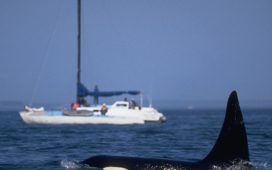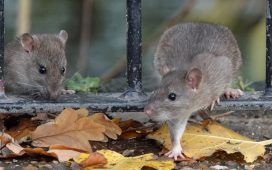Warning: Distressing photos
This is the result of an unprecedented massacre of nearly 1,500 dolphins off the coast of the Faroe Islands in just one single day.
Every year pilot whales and white-sided dolphins are led to the beach and slaughtered as part of the country’s century-old traditional Grindadrap hunt.
They are driven for hours on end by hunters using boats and jet-skis until they are stranded and helpless on the beach.
Hunters then cut through their necks using knives or harpoons, turning the sea bright red with their blood.
The Faroese usually kill around 1,000 mammals in this way over the summer months, so even ardent hunters have been shocked by the number slaughtered on Sunday evening.
Each region of Danish territory has its own designated grind-foreman who authorises whether or not a hunt can go ahead.
The Faroese government claims Sunday’s hunt on the island of Skálafjørðuras was authorised and legal.
But the Sea Shepherd Conservation Society, which has Faroese members in its ranks, disputes this, claiming it was wrongly given the go-ahead by the foreman of a different area.
The non-profit organisation’s chief operating officer, Rob Read, told Metro.co.uk: ‘Even the Faroese have never carried out a sustainability study into the hunting of white-sided dolphins.
‘No one knows the population of Atlantic white-sided dolphins in the region at all.
‘The hunt is just continued as a sport attached to some false sense of cultural identity hidden by a cloak of tradition, when it is far, far, far from the traditional hunt it once was.
‘These days it’s done by sport fishing boats, rigs and jetskis, so dolphins and pilot whales have absolutely no chance of escaping.
‘Unlike pretty much any other hunt in the world, the whole pod, the whole family is killed.
‘It kills the whole family group, that whole gene pool. It doesn’t matter, pregnant mothers, calves, they’re all killed.’
To put Sunday’s numbers in perspective, Mr Read says the second largest hunt in the Faroe Islands was in 1940, when 1,200 pilot whales were killed in one day.
He added: ‘You’re talking about over 500 years of continuous records. This is quite staggering.’
‘Even some pro-whalers who despise Sea Shepherd have spoken out against this hunt saying “it should never have happened, the pod was too big, we’ve got no need for this meat”, what they’re basically saying is “what the hell are we going to do with it all?”.’
Mr Read said Faroese speaking members of Sea Shepherd translated comments online from pro-whalers after Sunday’s bloodbath.
He says they knew the district’s grind-foreman and that he would never have authorised this hunt due to the sheer number of animals to people.
‘But because he was unreachable or because he was away someone else authorised this hunt and that’s where the criticism has come from,’ Mr Read added.
‘We can’t see any precedent for it because it’s never been a situation we’ve seen happen before.’
Volunteer at the Blue Planet Society John Hourston said: ‘In my view this is comparable to the massacre of the North American bison.
‘Denmark and the EU can’t turn a blind eye to this, they have turned a blind eye because they’re an autonomous country but that doesn’t mean they can’t apply sanctions as we buy a lot of stuff from them, we buy a lot of fish.
‘We are talking about a population massacre so this may have an impact on the population of white sided dolphins and it’s a protected species. This was a super-pod killed in one fell swoop.
‘From everything I’m seeing, the local foreman did not authorise it because there were not enough people and far too many dolphins and there was no way of limiting the amount of suffering.
‘The justification that we get on an ongoing basis is that this is for food, despite the fact that the Faroe Islands is one of the richest countries in the European economic zone. They have supermarkets all over.’
‘This could have a knock-on effect on that species in the North Atlantic for years. What we have is a country in the North Atlantic who are doing whatever they want, whenever they want and that is unacceptable to their neighbours.’
Humane Society International’s executive director Claire Bass told Metro.co.uk: ‘The footage of this massacre of almost 1,500 white-sided dolphins is truly stomach churning.
‘I have witnessed first-hand the bloody carnage of Faroese whale and dolphin hunts, and they always cause suffering, but this hunt was exceptional in its gratuitous cruelty and scale.
‘These are highly intelligent, social creatures being ineptly hacked to death, while young children paddle between them in a sea of blood.
‘This may well be the largest and bloodiest dolphin hunt in history, and is reportedly causing shock and condemnation within the Faroes community itself.’
PETA’s Director Elisa Allen added: ‘Every year, to the horror of the rest of the world, hundreds of whales and dolphins are chased into bays on the Faroe Islands and massacred in barbaric ways with metal hooks, which are driven into the stranded mammals’ blowholes before their spines are cut.
‘The animals cry out in pain. Whole families are slaughtered, and some animals are seen swimming around in their family members’ blood for hours.
‘Whales and dolphins are highly intelligent and feel pain and fear every bit as much as humans do.’
However the Faroese government has tried to play down the criticism, and claims the whales and dolphins killed are a valuable source of food.
A spokesman told Metro.co.uk: ‘I can confirm that approximately 1400 White-sided dolphins where caught Sunday in Skálafjørður.
‘The hunt on Sunday was given permission and authorised by the District Administrator.
‘The commonly occurring pilot whales are taken for their meat and blubber in whale drives which are organised on the community level and regulated by national legislation and regulations.
‘White-sided dolphins are also a commonly occurring and abundant species around the Faroe Islands.
‘Individual animals occasionally occur together with schools of pilot whales, while separate schools are also sometimes driven and beached, and fully utilised for human consumption.
‘The driving and killing of dolphins in the Faroe Islands must be carried out according to the same regulations which apply to pilot whales.
Staff from Pen Farthing’s animal shelter successfully evacuated to Pakistan
‘The Faroe Islanders catch on average annually approximately 250 White-sided dolphins.
But as with pilot whales the number fluctuates greatly from year to year. The catch on Sunday was exceptionally large. The Faroese take on average 800 pilot whales annually.
‘Pilot whales and other small whales are utilised for food in the Faroe Islands and represent one of few local sources of meat that does not have to be imported from afar.
‘The meat from each whale drive provide a large amount of valuable food, which is distributed free in the local communities where the whale drives take place, food that would otherwise have to be imported from sources in other countries.
‘There is no doubt that the Faroese whale hunts are a dramatic sight to people unfamiliar to the hunts and slaughter of mammals. The hunts are, nevertheless, well organised and fully regulated.’
The Faroe Island’s Ministry of Fisheries has been contacted for comment.
Get in touch with our news team by emailing us at webnews@metro.co.uk.
For more stories like this, check our news page.
















